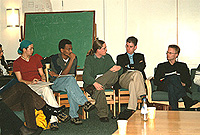![[Currents header graphic]](/homeart/currents_header.gif)
![[Currents header graphic]](/homeart/currents_header.gif)
February 15, 1999
A campus coalition is sponsoring a forum on affirmative action on Friday, February 19.|
| 
UCSC students, including (l-r) Shane Namkung Hara, Berhan Bayleyegn, and Daniel Jackson, spoke about affirmative action to an international audience at College Eight (more photos).
| |
Five UCSC students helped teach nearly two dozen people from countries around the world about affirmative action and diversity in California during an hourlong presentation last week.
The discussion took place last Monday at College Eight as part of the International Visitor Program, which is administered by the U.S. Information Agency's Bureau of Educational and Cultural Affairs. The program brought 22 people in government and government-related positions to the United States to learn about American culture and increase mutual understanding between countries.
UCSC was one stop on the group's three-week tour, which took in Washington, D.C.; New York City; Toledo and Akron, Ohio; San Francisco; San Jose; and Atlanta.
In San Jose, the group's eclectic schedule included learning about the Semiconductor Industry Association, exploring the Museum of Technology, and touring River Glen Elementary School.
"We're a very diverse group, from 16 countries, and we all have different interests," said group member Steven King of the United Kingdom, a special adviser to a member of parliament in the U.K. and deputy leader of the Ulster Unionist Party.
The discussion of affirmative action, King said, was something he had specifically requested.
At Queens University in Northern Ireland, where King is on the board of regents, the university faculty and staff is disproportionally Protestant, while students are disproportionally Catholic, he explained.
"In Northern Ireland, we're dealing with issues of religion rather than race," he said. "I want to compare how (affirmative action) works in California with back home in Northern Ireland."
At the UCSC discussion, the students drew from facts about California's ethnic and economic makeup and from their own observations and experiences to shed light on affirmative action and diversity in the state.
They discussed the numerous languages that are spoken in California, the economic inequalities between races, the history of racial discrimination, and the differences between public schools in wealthy and poor areas of the state.
Overall, the UCSC group emphasized that affirmative action is an institution that--while imperfect--is necessary to level the playing field for all ethnic groups.
"Affirmative action made it possible for us to get into the university and to have access to jobs we were denied previously," said Berhan Bayleyegn, a fourth-year student majoring in economics. "The idea was to allow those who were qualified to have access to the university."
Francisco J. Hernandez, vice chancellor for Student Affairs, and Valerie Simmons, director of Equal Employment Opportunity/Affirmative Action, joined the student speakers to discuss how affirmative action had been applied in the past to student admissions and faculty and staff recruitment and hiring.
As a result of initiatives passed by the UC Board Regents and changes to state law, UC campuses are no longer allowed to take race or gender into consideration when making admissions, employment, or contracting decisions.
Some Regents have proposed that the board repeal the two initiatives banning affirmative action at UC, Hernandez said. Such a repeal would be mostly symbolic, however, because the state law against racial preferences takes precedence over university policy.
The international visitors and their UCSC hosts agreed that an important step toward providing equal opportunity for all would be to ensure that students in public schools across the state receive equally good education.
"The problem we face is that we haven't provided equal opportunity, and so what do you do?" Hernandez asked. "Affirmative action is not the perfect thing to do, it may not even be the fair thing to do, but it is the right thing to do."